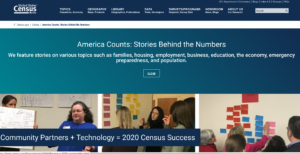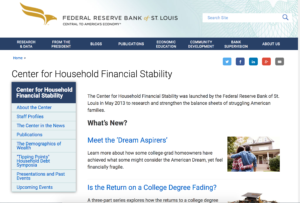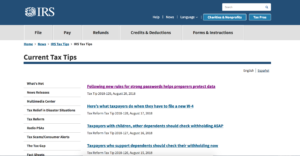This blog post provides information about four resources for financial information.
This website offers a wealth of hands-on ideas for teaching personal finance topics. I use this website by picking a topic on the curriculum site and look over the lesson guides. These guides contain a quick overview of hands-on activities, questions for reflection, and videos, including an estimate of the time needed for each piece. A log-in is required but there is no charge for using the website. In addition, Next Gen Personal Finance offers an email newsletter with many tips and best practices for teaching personal finance. While the website is focused on high school instruction, I consider the tools appropriate for any instruction of basic personal finance topics.
America Counts: Stories Behind The Numbers, U.S. Census Bureau
About a year ago, the U.S. Census Bureau started a new information service, called “America Counts: Stories by the number.” This website and newsletter provide stories about the data that the Census collects about families, housing, employment, business, education, and the economy. For example, a recent story examined the tensions in couples when wives earn more than husbands, and how it influences how earnings are reported in the Census. The Census found that “when wives earn more than their husbands do, a puzzling thing can happen: Husbands say they earn more than they are and wives underreport their income.” Subscription to the America Counts newsletter via the Census Bureau’s subscription website.
Center for Household Financial Stability, Federal Reserve Bank of St. Louis
The Federal Reserve Bank of St. Louis started its Center for Household Financial Stability about five years ago. The website and newsletter of the Center provide many reports about how families make ends meet in difficult financial times. The newsletters are well written, short, and very much to the point. Recent topics included “College-Grad Homeowners under Financial Stress” and “Is College Still Worth It?”. Sign up for the newsletter here: https://www.stlouisfed.org/household-financial-stability/newsletter
I confess, I love the IRS Tax Tips! Every day, the IRS sends an email which provides a wealth of useful information, during and outside tax season. A recent example is information about how to come up with strong passwords. I think this is very useful information especially for the many financial accounts we now access online. According to the IRS, “… passwords should:
- Use a combination of letters, numbers and symbols; something like SomethingYouCanRemember@30!
- Use word phrases that are easy to remember rather than random letters, characters and numbers that are harder to remember. By using a phrase, preparers don’t have to write down the password, which exposes it to more risk.
- Use a minimum of eight characters; longer is better.
- Use strong, unique passwords for all accounts, whether it’s to access a device, tax software products, cloud storage, wireless networks or encryption technology.
- Avoid personal information or common passwords.
- Change default and temporary passwords that come with accounts or devices.
- Not reusing passwords. For example, changing Bgood!17 to Bgood!18 is not good enough.
- Not using email addresses as usernames.
- Store any password list in a secure location, such as a safe or locked file cabinet.
- Not disclosing passwords to anyone for any reason.
- Use a password manager program to track passwords, but protect it with a strong password.
- Opt for a multi-factor authentication process when available. Many email providers now offer customers two-factor authentication protections to access email accounts.” (Tax Tip 2018-129, August 20, 2018)





